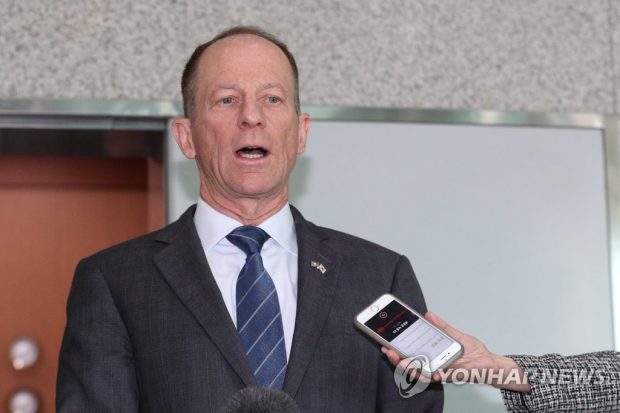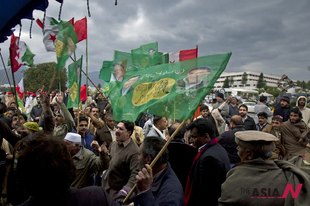Senior U.S. diplomat calls recent Moon-Abe meeting ‘encouraging’ sign

Seoul: The top American diplomat for East Asia on Wednesday described this week’s meeting between South Korean President Moon Jae-in and Japanese Prime Minister Shinzo Abe as an “encouraging” sign in fence-mending efforts between Seoul and Tokyo.
Assistant Secretary of State David Stilwell made the remarks after paying courtesy calls on Foreign Minister Kang Kyung-wha and Vice Foreign Minister Cho Sei-young during his trip here seen as an effort to help defuse tensions over trade and history between Washington’s two Asian allies.
“Very encouraged while we were there to note that President Moon and Prime Minister Abe had the opportunity to talk and that’s an encouraging sign as we watched the relationship improve,” Stilwell told reporters.
Moon and Abe had an 11-minute meeting on the sidelines of multilateral summits involving the Association of Southeast Asian Nations (ASEAN) in Bangkok on Monday, raising hope for a thaw in the chilled bilateral ties.
Stilwell also called the South Korea-U.S. alliance the “linchpin” of peace and security in the Indo-Pacific region.
He arrived in South Korea Tuesday, as the General Security of Military Information Agreement (GSOMIA), seen as a symbolic tool to foster the U.S.’ trilateral security cooperation with its Asian allies, is set to expire on Nov. 23 unless Seoul reverses its decision to end it.
In August, Seoul announced the decision in response to Tokyo’s new export curbs seen as political retaliation for last year’s Korean Supreme Court rulings that ordered Japanese firms to compensate victims of wartime forced labor.
Washington has recently been seen heaping pressure on Seoul to retract that decision, stressing the importance of three-way security cooperation among the U.S., South Korea and Japan.
During the courtesy call, Minister Kang noted the allies’ recent document that outlines specific areas of cooperation between their regional policy initiatives — Seoul’s New Southern Policy and Washington’s Indo-Pacific Strategy, calling it “very good guidance.”
Stilwell said in turn, “In fact, we came to the same conclusions almost independently. It says a lot about the alliance’s worldviews as well.”
The allies released the document after Stilwell and his South Korean counterpart, Yoon Soon-gu, held talks on the margins of multilateral summits in Bangkok on Saturday.
In the press availability later, the U.S. diplomat also mentioned the alliance document.
“We managed to further strengthen that (relationship) in our interactions in Bangkok at the East Asia Summit where we released a document that identifies areas where the Indo-Pacific Strategy and the New Southern Policy overlap,” he said.
“It’s significant in the areas we identify of mutual interest and areas of potential cooperation,” he added.
The U.S. diplomat is also expected to meet officials from the presidential office Cheong Wa Dae and defense ministry, such as Deputy Defense Minister Chung Suk-hwan.
His visit to Seoul coincided with trips here by other senior State Department officials who came here to attend the Senior Economic Dialogue or the South Korea-U.S. joint public-private economic forum, or for other purposes.
Among them are Keith Krach, under secretary for economic growth, energy and environment; Marc Knapper, deputy assistant secretary for Korea and Japan; and James DeHart, the top negotiator in defense cost-sharing negotiations with South Korea.
During their stay, the U.S. officials are expected to step up efforts to fend off the GSOMIA termination and encourage Seoul to more actively explore ways to find common ground between the allies’ regional policy initiatives.
Stilwell is in Seoul as part of his Asia trip that has included stops to Japan, Myanmar, Malaysia and Thailand. He will travel to Beijing on Thursday.
YONHAP




